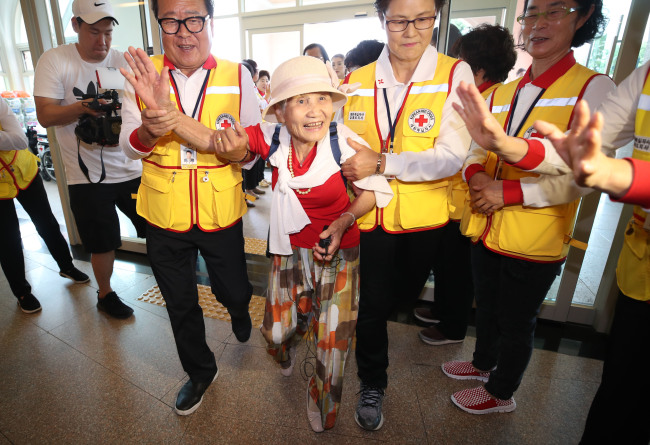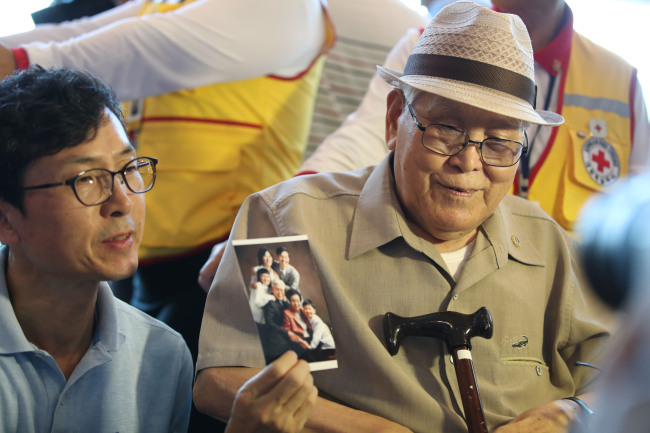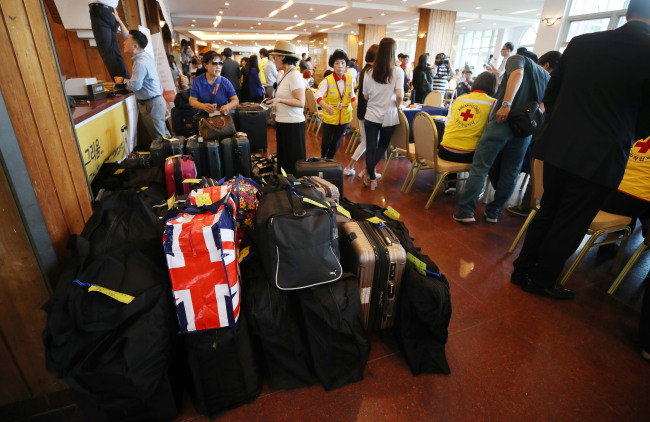Elderly S. Koreans prepare for family reunions in NK
By Jung Min-kyungPublished : Aug. 19, 2018 - 15:22
The first batch of South Koreans selected to attend the reunion event in North Korea for families separated by the 1950-53 Korean War gathered in a northeastern coastal town on Sunday to prepare for the event.
A group of 89 elderly South Koreans who were chosen to reunite with their North Korean families from Monday to Wednesday arrived at the Hanwha Resort in Sokcho, Gangwon Province, 158 kilometers from Seoul early in the morning, the South’s Ministry of Unification said. They will be briefed on procedures and protocols for the event throughout Sunday before embarking on a trip to the event venue of Kumgangsan, located on the North’s east coast via a land route at 8:30 a.m. on Monday, the ministry added.
A group of 89 elderly South Koreans who were chosen to reunite with their North Korean families from Monday to Wednesday arrived at the Hanwha Resort in Sokcho, Gangwon Province, 158 kilometers from Seoul early in the morning, the South’s Ministry of Unification said. They will be briefed on procedures and protocols for the event throughout Sunday before embarking on a trip to the event venue of Kumgangsan, located on the North’s east coast via a land route at 8:30 a.m. on Monday, the ministry added.

The 89 will attend the first round of a two-part event. The second round will be held from Friday to Sunday with separate participants, including 83 North Korean members of separated families.
The family members will be granted around 11 hours of face-to-face meetings for each round, a ministry official previously said. The itinerary provided by the South’s Korean Red Cross shows that the families will interact with each other through a series of meals, but stay and sleep in separate rooms.
The eldest among those selected for the first round is 101-year-old Baik Sung-gyu, who plans to meet his daughter-in-law and granddaughter in the North.
Holding the event for the reunions of separated families was a clause in the agreement reached by South Korean President Moon Jae-in and North Korean leader Kim Jong-un at the landmark April summit.


The event was last held in October 2015 and was halted over escalated border tensions on the back of the North’s military provocations and pursuit of its nuclear weapons program. A total of 20 rounds of face-to-face family reunions have been held since the first inter-Korean summit in 2000.
Since Moon took office last year, officials and experts have expressed concerns on the advanced age of the family members. While there were initially 132,124 South Korean members registered in a government database, only 56,990 remain alive as of August. Among them, nearly 86 percent of the group are 70 or older.
Out of those who made the final cut this year, four South Koreans and five North Koreans had to withdraw over what is believed to be health issues.
Experts have called for regularization of cross-border video calls and letter exchanges to help fulfill the wishes of those wanting to establish or maintain communication with their family.
“It seems video calls are the most efficient resolution at the moment when considering North Korea’s regime,” said Park Won-gon, a professor at Handong Global University, pointing to the North’s concerns that “excessive interaction” between South and North Korean citizens may lead to the demise of its regime.
“Regarding exchange of letters, it seems North Korea censors the contents too much, so it will not be a satisfactory method. The systems are there, but are yet to be regularized.”
The South and North finalized the list of participants early this month. Priority was given to those who had direct family members on the other side of the border.
The two Koreas technically remain at war, as the Korean War ended only with an armistice, not a peace treaty.
By Jung Min-kyung (mkjung@heraldcorp.com)






![[Weekender] How DDP emerged as an icon of Seoul](http://res.heraldm.com/phpwas/restmb_idxmake.php?idx=644&simg=/content/image/2024/04/25/20240425050915_0.jpg&u=)

![[KH Explains] No more 'Michael' at Kakao Games](http://res.heraldm.com/phpwas/restmb_idxmake.php?idx=644&simg=/content/image/2024/04/28/20240428050183_0.jpg&u=20240428180321)









![[Herald Interview] Mistakes turn into blessings in street performance, director says](http://res.heraldm.com/phpwas/restmb_idxmake.php?idx=652&simg=/content/image/2024/04/28/20240428050150_0.jpg&u=20240428174656)
